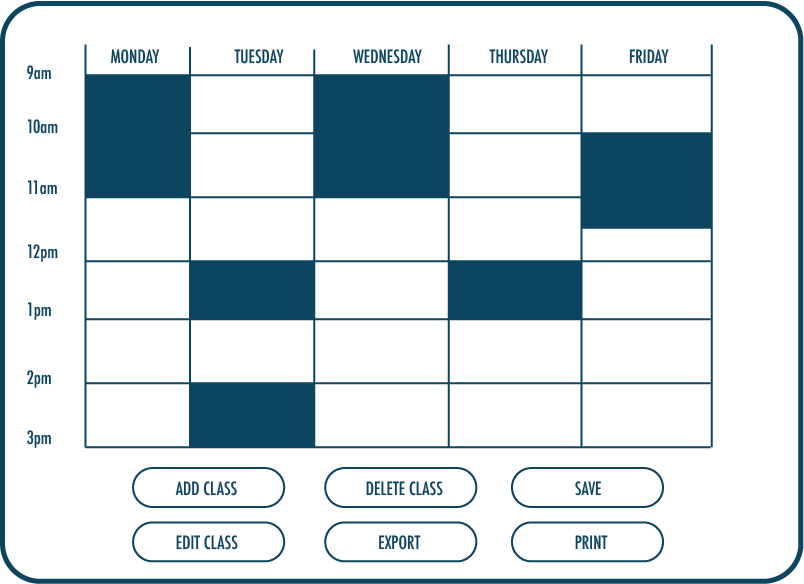How To Create An Optimal College Schedule
Topics Covered
Click To Jump To A Specific Section
Get More Help
Other Educational Reources
Browse personalized mentoring / coaching options or documents / templates that fit the needs of any student
Registration can be very confusing for new students because it isn’t streamlined and tends to vary between colleges. If you’re looking for specific registration information for your school, it’s best to contact a student mentor as they will know the exact system your school uses. However, each school’s registration should follow a relatively similar structure described below.
How To Register
- If you’re worried about figuring out registration right after you’ve enrolled, don’t. Your school will have an orientation process that you sign up for during or soon after enrollment. While you’re at orientation, mentors and counselors will walk you through your school’s process for registering.
- Typically, your school will have a website where you go to manage your classes, billing statements, grades, and more. Sometimes these websites will be broken up and while it would seem logical to keep all those things in one place, they might not be due to their website/server capacities and capabilities.
- The website your school uses will have a tab for registration and might also have a separate link to a master list of classes, sections, instructors, capacities, and times. If your school has both, keep them open in separate tabs.
-
At this point, you’re ready to select the classes you want to register for. The next logical questions are “What do I register for?” and “How should I make my schedule?”
What Classes You Should Take
- Your first resource is your counselors and student mentors who will be helping you register for your first time. They will know exactly what you should be taking and they will give you the resources and information you need.
- Your second resource is four-year plans that may be provided on your school’s website or through your counselor. This can be found by searching for the page for your specific major. For example, if you’re at the University of Pennsylvania studying Mechanical Engineering, you’d go to the University of Pennsylvania’s Mechanical Engineering page which will have four-year plans, departmental scholarships, faculty lists, and other relevant news and information.
- Another way to find the four-year plans and sample schedules is to, using the example above, search “University of Pennsylvania Mechanical Engineering four-year plan.”
What Your Schedule Should Look Like
Making your first schedule can be a strange experience because it is usually the first time you make all the decisions regarding times, sections, instructors, and more. If you want to get up at 8:00 a.m. every day then you’re free to do that. If you want to sleep in everyday or even take all afternoon and evening classes, then you’re free to do that as well. However, there are a couple things to be mindful of:
- Gaps: some people enjoy having gaps between classes because it gives them an extra hour or two to study, grab something to eat, or run an errand. However, others don’t like to wait around and prefer to get their classes out of the way as soon as possible so they can get on with their day.
- Walking Conflicts: It’s common for classes to end and start within 10-15 minutes of each other making it convenient to walk from one to the other. This might be tempting to avoid downtime, but you have to make sure that you can get from one class to the other without being late. You can figure this out by visiting campus and seeing how far apart some of the buildings are or by using online map services to find how long the walk is. Some schools have their own campus map database that can be very helpful for this.
- Professors: this is a surprisingly important aspect of registration that some people don’t bother to look at. However, a professor could make or break your semester. A good professor can make difficult classes like Organic Chemistry seem like a breeze while a bad professor could just as easily ruin your GPA. Services like Rate my Professors give detailed reviews about professors. You might find, especially in programs that require a high GPA, that it’s worth it to take a class with a better rated professor even if the time isn’t optimal.
- Prerequisites: most of the upper level classes offered will have prerequisites, which are required classes you have to pass to take the class. This can lead to some tricky situations especially if your schedule is abnormal due to things like AP credits. However, faculty and counselors will help to sort things out and if you’re desperate to get in, you can try the hold file as described below.

Waitlist and Hold File
Not getting into a class you want can be very frustrating, but there are options that will help you get in.
- Waitlists allow you to put your name on a queue to get into the class next. Like you, others are constantly adding, dropping, and adjusting their schedule. If somebody drops from a full class, the next person in line on the waitlist will be enrolled in that class.
- Some schools have special requirements for waitlisted students, like having to attend the class for the first week or two to continually check-in and see if there’s an opening to show your interest in the course. Your school will make you aware of this if you choose to waitlist.
- Hold file is similar to the waitlist but is designed for different students in mind. Hold file students are the last ones who are given a spot in a class and are lowest on the totem pole. Hold file is designed for students who have extenuating circumstances such as not having the prerequisites and requesting special permission from the department to take the course. While the department will often grant them the ability to take the class, they’ll still be given a spot behind other students who are appropriately qualified for the course.
How to Register During the Following Semesters
- The earlier the better: Most courses are first–come, first–serve for registration, so the faster you can get to advising to get your block removed or the faster you can register after registration opens, the better.
- Schools may require you to return to a counselor at least once each semester to check your schedule. There, they can double check what you plan on taking and offer their advice.
- When a school requires you to see the counselor to double check classes, they often have something called an “advising block” which means that your registration website will prevent you from registering until you go to that counseling appointment.
- As you continue through college, you’ll figure out which type of schedule works for you and can continue to adjust your schedules to suit your needs.

Sean Fowler
Writer
Our writers are always current students to ensure our guides are applicable and relevant. Click on the writer’s name above to learn more about them!

EP Enterprise
Our Team
It takes a team to build and power this platform! Check out our full team by clicking the platform name above.